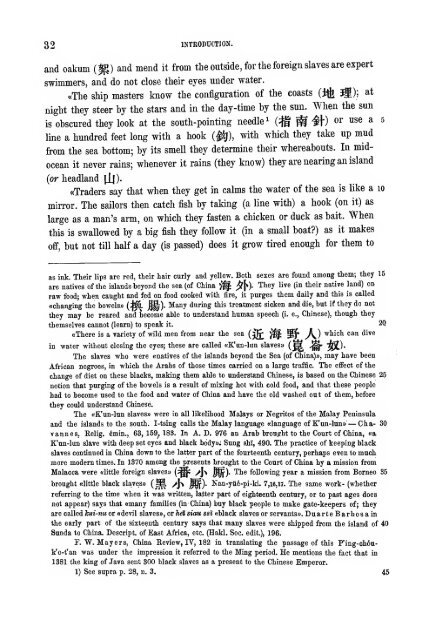Chau Ju-Kua - University of Oregon Libraries
Chau Ju-Kua - University of Oregon Libraries
Chau Ju-Kua - University of Oregon Libraries
You also want an ePaper? Increase the reach of your titles
YUMPU automatically turns print PDFs into web optimized ePapers that Google loves.
32<br />
and oakum {%)<br />
INTRODUCTION.<br />
and mend it from the outside, for the foreign slaves are expert<br />
swimmers, and do not close their eyes under water.<br />
«Tlie ship masters know the configuration <strong>of</strong> the coasts (i^ ^); at<br />
night they steer by the stars and in the day-time by the sun. When the sun<br />
is obscured they look at the south-pointing needle ^ (:jf ^ ^) or use a 5<br />
line a hundred feet long with a hook (^), with which they take up mud<br />
from the sea bottom; by its smell they determine their whereabouts. In mid-<br />
ocean it never rains; whenever it rains (they know) they are nearing an island<br />
{or headland (Jj).<br />
((Traders say that when they get in calms the water <strong>of</strong> the sea is like a lo<br />
mirror. The sailors then catch fish by taking (a line with) a hook (on it) as<br />
large as a man's arm, on which they fasten a chicken or duck as bait. When<br />
this is swallowed by a big fish they follow it (in a small boat?) as it makes<br />
<strong>of</strong>f, but not till half a day (is passed) does it grow tired enough for them to<br />
as ink. Their lips are red, their hair curly and yellow. Both sexes are found among them; they 15<br />
are natives <strong>of</strong> the islands beyond the sea (<strong>of</strong> China '/^ ^|»). They live (in their native land) on<br />
raw food; when caught and fed on food cooked with fire, it purges them daily and this is called<br />
((Changing the bowelss {^ J^).<br />
Many during this treatment sicken and die, but if they do not<br />
they may be reared and become able to understand human speech (i. e., Chinese), though they<br />
themselves cannot (learn) to speak it.<br />
((There is a variety <strong>of</strong> wild men from near the sea<br />
( jg^ *^ ^ ^)<br />
which can dive<br />
in water without closing the eyes; these are called «K.'un-lun slaves;) (ja J^ ^Z.)-<br />
The slaves who were anatives <strong>of</strong> the islands beyond the Sea (<strong>of</strong> China)», may have been<br />
African negroes, in which the Arabs <strong>of</strong> those times carried on a large traffic. The effect <strong>of</strong> the<br />
change <strong>of</strong> diet on these blacks, making them able to understand Chinese, is based on the Chinese 25<br />
notipn that purging <strong>of</strong> the bowels is a result <strong>of</strong> mixing hot with cold food, and that these people<br />
had to become used to the food and water <strong>of</strong> China and have the old washed out <strong>of</strong> them, before<br />
they could understand Chinese.<br />
The «K'un-lun slavess were in all likelihood Malays or Negritos <strong>of</strong> the Malay Peninsula<br />
and the islands to the south. I-tsing calls the Malay language ((language <strong>of</strong> K'un-luna — Cha- 30<br />
vannes, Kelig. dmin., 63, 159, 183. In A. D. 976 an Arab brought to the Court <strong>of</strong> China, aa<br />
K'nn-lun slave with deep set eyes and black body)); Sung shi, 490. The practice <strong>of</strong> keeping black<br />
slaves continued in China down to the latter part <strong>of</strong> the fourteenth century, perhaps even to much<br />
more modern times. In 1370 among the presents brought to the Court <strong>of</strong> China by a mission from<br />
Malacca were ((little foreign slavesa (^g: yj> ^K). The following year a mission from Borneo 35<br />
brought ((little black slaves)) (S^ yj-^ ^^)-<br />
Kan-yile-pi-ki. 7,16,17. The same work- (whether<br />
referring to the time when it was written, latter part <strong>of</strong> eighteenth century, or to past ages does<br />
not appear) says that «many families (in China) buy black people to make gate-keepers <strong>of</strong>; they<br />
are called Am«-wm or ((devil slaves)), ot h^siauss'i ((black slaves or servants)). Duarte Barbosain<br />
the early part <strong>of</strong> the sixteenth century says that many slaves were shipped from the island <strong>of</strong> 40<br />
Snnda to China. Descript. <strong>of</strong> East Africa, etc. (Hakl. Soc. edit.), 196.<br />
F.W.Mayers, China Eeview, IV, 182 in translating the passage <strong>of</strong> this P'ing-chou-<br />
k'o-t'an was under the impression it referred to the Ming period. He mentions the fact that in<br />
1381 the king <strong>of</strong> Java sent 300 black slaves as a present to the Chinese Emperor.<br />
1) See supra p. 28, n. 3. 45<br />
2Q

















